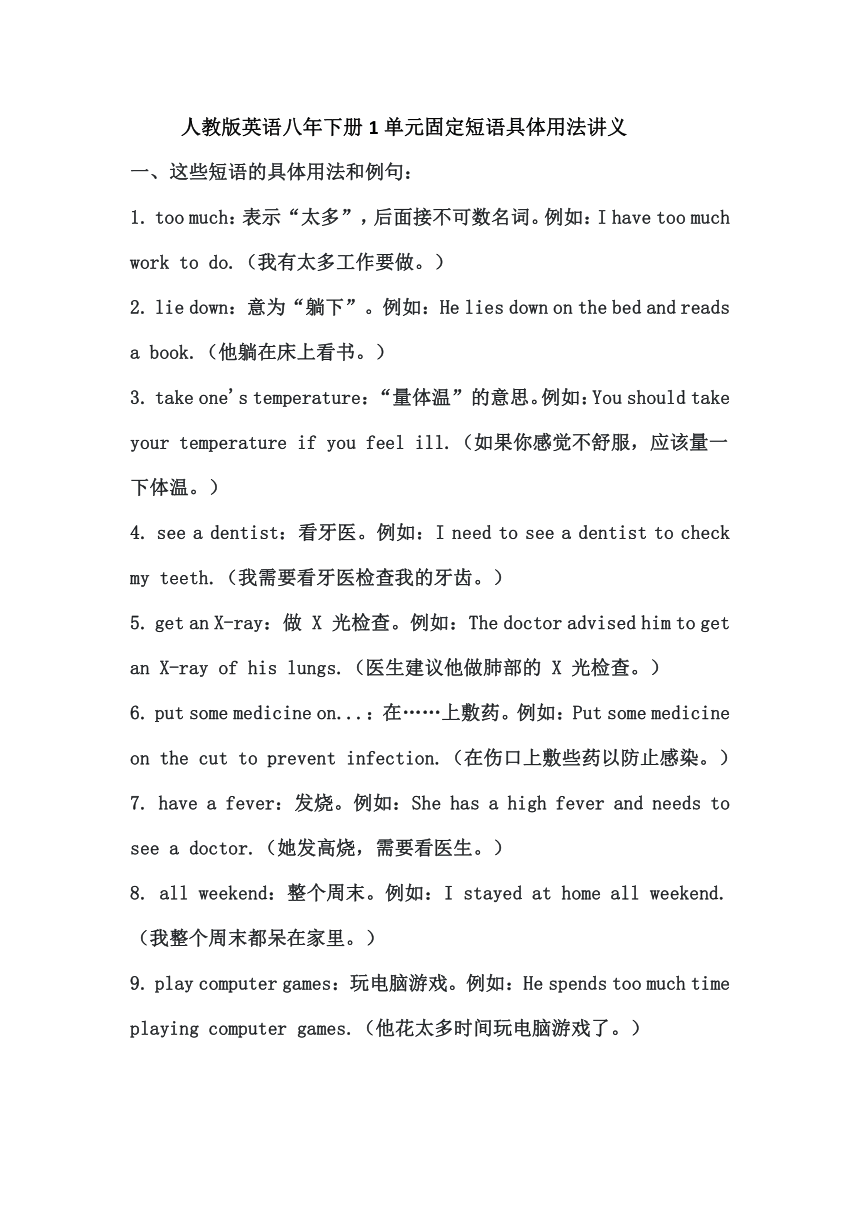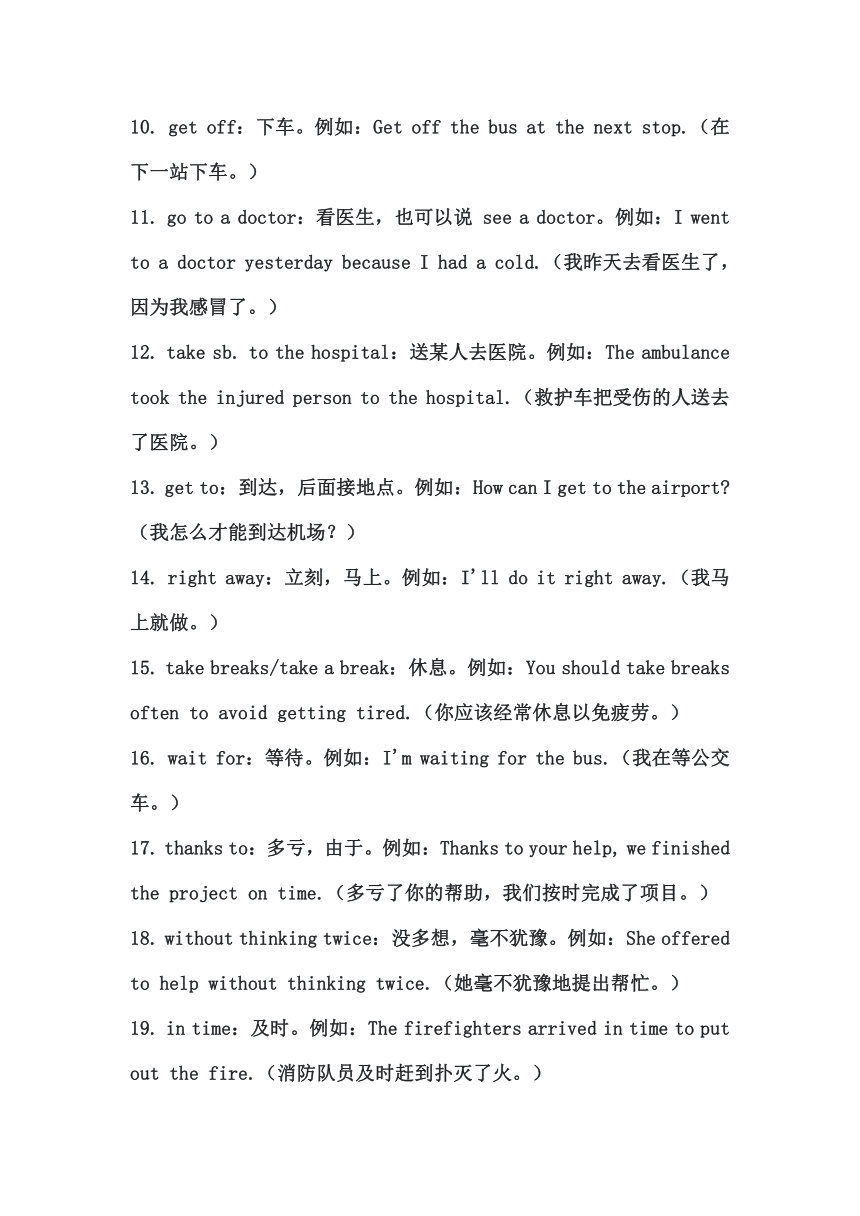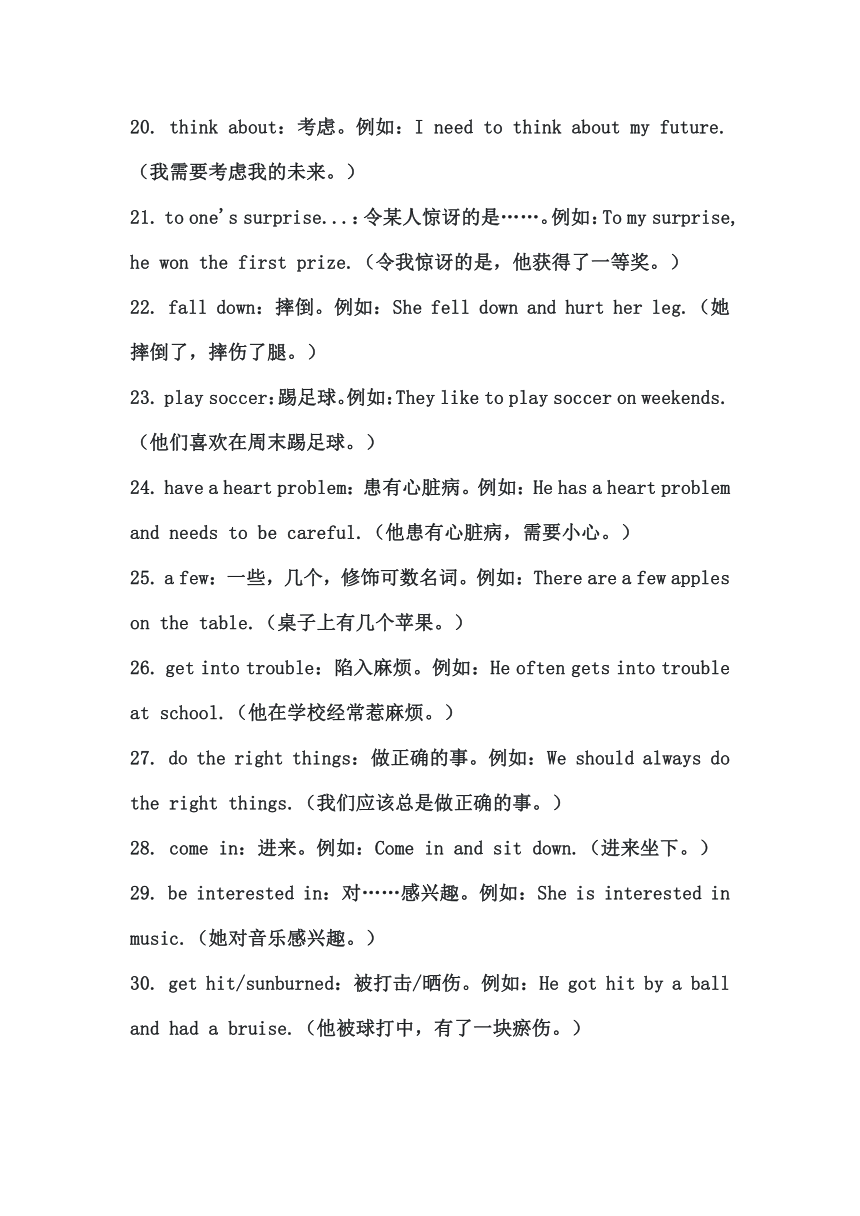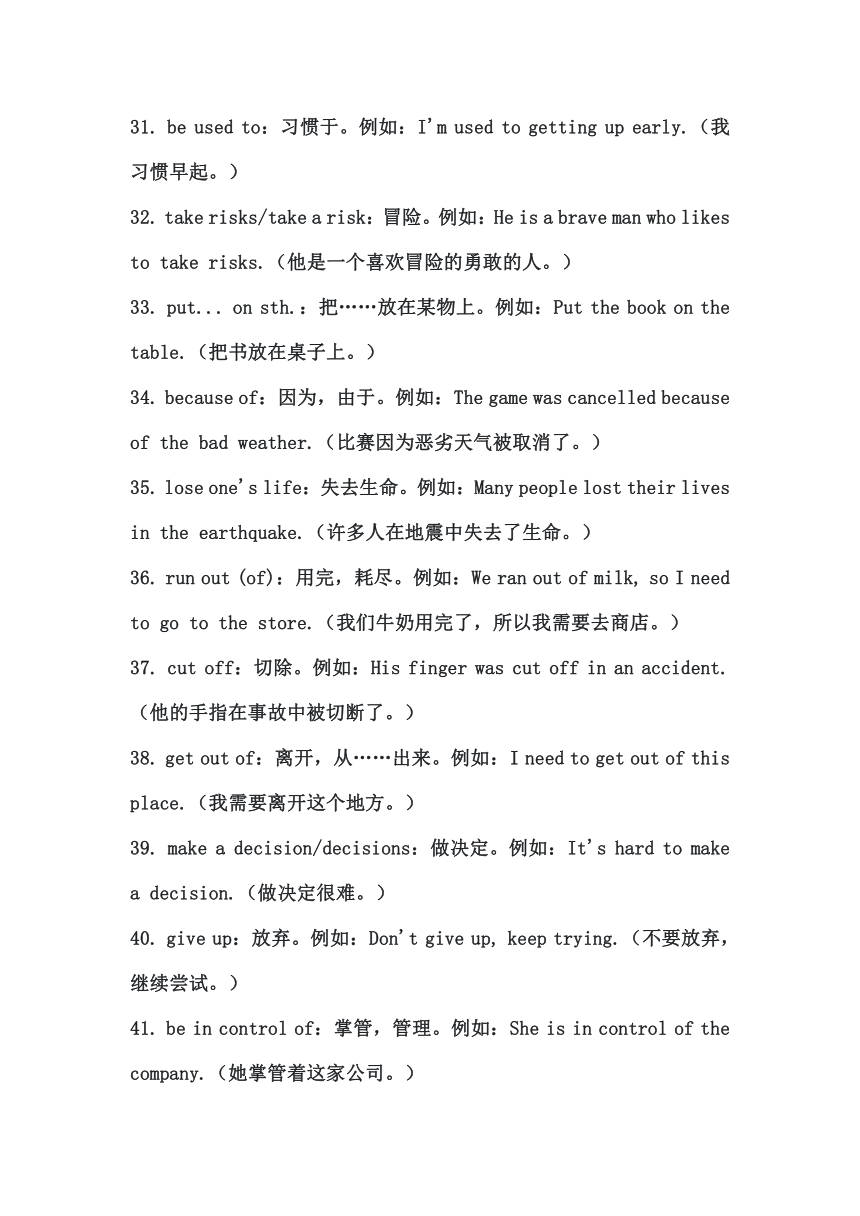Unit 1 What's the matter?单元固定短语具体用法讲义
文档属性
| 名称 | Unit 1 What's the matter?单元固定短语具体用法讲义 |

|
|
| 格式 | docx | ||
| 文件大小 | 21.0KB | ||
| 资源类型 | 教案 | ||
| 版本资源 | 人教新目标(Go for it)版 | ||
| 科目 | 英语 | ||
| 更新时间 | 2024-02-07 19:21:03 | ||
图片预览




文档简介
人教版英语八年下册1单元固定短语具体用法讲义
一、这些短语的具体用法和例句:
1. too much:表示“太多”,后面接不可数名词。例如:I have too much work to do.(我有太多工作要做。)
2. lie down:意为“躺下”。例如:He lies down on the bed and reads a book.(他躺在床上看书。)
3. take one's temperature:“量体温”的意思。例如:You should take your temperature if you feel ill.(如果你感觉不舒服,应该量一下体温。)
4. see a dentist:看牙医。例如:I need to see a dentist to check my teeth.(我需要看牙医检查我的牙齿。)
5. get an X-ray:做 X 光检查。例如:The doctor advised him to get an X-ray of his lungs.(医生建议他做肺部的 X 光检查。)
6. put some medicine on...:在……上敷药。例如:Put some medicine on the cut to prevent infection.(在伤口上敷些药以防止感染。)
7. have a fever:发烧。例如:She has a high fever and needs to see a doctor.(她发高烧,需要看医生。)
8. all weekend:整个周末。例如:I stayed at home all weekend.(我整个周末都呆在家里。)
9. play computer games:玩电脑游戏。例如:He spends too much time playing computer games.(他花太多时间玩电脑游戏了。)
10. get off:下车。例如:Get off the bus at the next stop.(在下一站下车。)
11. go to a doctor:看医生,也可以说 see a doctor。例如:I went to a doctor yesterday because I had a cold.(我昨天去看医生了,因为我感冒了。)
12. take sb. to the hospital:送某人去医院。例如:The ambulance took the injured person to the hospital.(救护车把受伤的人送去了医院。)
13. get to:到达,后面接地点。例如:How can I get to the airport (我怎么才能到达机场?)
14. right away:立刻,马上。例如:I'll do it right away.(我马上就做。)
15. take breaks/take a break:休息。例如:You should take breaks often to avoid getting tired.(你应该经常休息以免疲劳。)
16. wait for:等待。例如:I'm waiting for the bus.(我在等公交车。)
17. thanks to:多亏,由于。例如:Thanks to your help, we finished the project on time.(多亏了你的帮助,我们按时完成了项目。)
18. without thinking twice:没多想,毫不犹豫。例如:She offered to help without thinking twice.(她毫不犹豫地提出帮忙。)
19. in time:及时。例如:The firefighters arrived in time to put out the fire.(消防队员及时赶到扑灭了火。)
20. think about:考虑。例如:I need to think about my future.(我需要考虑我的未来。)
21. to one's surprise...:令某人惊讶的是……。例如:To my surprise, he won the first prize.(令我惊讶的是,他获得了一等奖。)
22. fall down:摔倒。例如:She fell down and hurt her leg.(她摔倒了,摔伤了腿。)
23. play soccer:踢足球。例如:They like to play soccer on weekends.(他们喜欢在周末踢足球。)
24. have a heart problem:患有心脏病。例如:He has a heart problem and needs to be careful.(他患有心脏病,需要小心。)
25. a few:一些,几个,修饰可数名词。例如:There are a few apples on the table.(桌子上有几个苹果。)
26. get into trouble:陷入麻烦。例如:He often gets into trouble at school.(他在学校经常惹麻烦。)
27. do the right things:做正确的事。例如:We should always do the right things.(我们应该总是做正确的事。)
e in:进来。例如:Come in and sit down.(进来坐下。)
29. be interested in:对……感兴趣。例如:She is interested in music.(她对音乐感兴趣。)
30. get hit/sunburned:被打击/晒伤。例如:He got hit by a ball and had a bruise.(他被球打中,有了一块瘀伤。)
31. be used to:习惯于。例如:I'm used to getting up early.(我习惯早起。)
32. take risks/take a risk:冒险。例如:He is a brave man who likes to take risks.(他是一个喜欢冒险的勇敢的人。)
33. put... on sth.:把……放在某物上。例如:Put the book on the table.(把书放在桌子上。)
34. because of:因为,由于。例如:The game was cancelled because of the bad weather.(比赛因为恶劣天气被取消了。)
35. lose one's life:失去生命。例如:Many people lost their lives in the earthquake.(许多人在地震中失去了生命。)
36. run out (of):用完,耗尽。例如:We ran out of milk, so I need to go to the store.(我们牛奶用完了,所以我需要去商店。)
37. cut off:切除。例如:His finger was cut off in an accident.(他的手指在事故中被切断了。)
38. get out of:离开,从……出来。例如:I need to get out of this place.(我需要离开这个地方。)
39. make a decision/decisions:做决定。例如:It's hard to make a decision.(做决定很难。)
40. give up:放弃。例如:Don't give up, keep trying.(不要放弃,继续尝试。)
41. be in control of:掌管,管理。例如:She is in control of the company.(她掌管着这家公司。)
42. go mountain climbing:去爬山。例如:Let's go mountain climbing this weekend.(我们这周末去爬山吧。)
二、练习题和详细讲解
1. I have ___ homework to do today. It's really tiring.
A. too much B. too many C. much too
此题考查“too much”“too many”和“much too”的用法区别。“too much”表示“太多”,后跟不可数名词;“too many”也表示“太多”,后跟可数名词复数;“much too”表示“太……”,后跟形容词或副词。作业(homework)是不可数名词,所以答案选 A。
2. If you have a fever, you should ___ your temperature.
A. take B. put C. make
此题考查“take one's temperature”这一短语的固定搭配。“take one's temperature”意为“量体温”,是固定用法,所以答案选 A。
3. My head hurts. I need to ___ a doctor.
A. see B. look C. watch
此题考查“see a doctor”这一短语的固定搭配。“see a doctor”意为“看医生”,是固定用法,所以答案选 A。
4. I ___ playing computer games all weekend.
A. take B. spend C. cost
此题考查spend 的用法。spend time (in) doing sth. 意为“花费时间做某事”,是固定用法。根据句意“我整个周末都在玩电脑游戏”,可知答案选 B。
5. You should put some medicine ___ your cut.
A. in B. on C. at
此题考查“put some medicine on…”这一短语的固定搭配。“put some medicine on…”意为“在……上敷药”,是固定用法,所以答案选 B。
6. The old man fell down and hurt his leg. We should ___ him to the hospital.
A. take B. bring C. carry
此题考查“take sb. to the hospital”这一短语的固定搭配。“take sb. to the hospital”意为“送某人去医院”,是固定用法,所以答案选 A。
7. I didn't think twice and ___ the bus.
A. got off B. got on C. took off
此题考查“get off”这一短语的含义。“get off”有“下车”的意思。根据句意“我没有多想就下了公交车”,可知答案选 A。
8. Thanks to the doctor, he was saved ___ time.
A. in B. on C. at
此题考查“in time”这一短语的固定搭配。“in time”意为“及时”,是固定用法,所以答案选 A。
9. You should think ___ before you make a decision.
A. about B. over C. of
此题考查“think about”这一短语的固定搭配。“think about”意为“考虑”,是固定用法,所以答案选 A。
10. To my surprise, he passed the exam ___ .
A. easily B. easy C. different
此题考查副词的用法。“easily”是副词,修饰动词 passed。“easy”是形容词,“different”是不同的。根据句意“令我惊讶的是,他轻松地通过了考试”,可知答案选 A。
11. He is used to ___ up early in the morning.
A. get B. getting C. got
此题考查“be used to doing sth.”这一短语的固定搭配。“be used to doing sth.”意为“习惯于做某事”,是固定用法,所以答案选 B。
12. Don't take risks. You should always ___ the right things.
A. do B. make C. take
此题考查“do the right things”这一短语的固定搭配。“do the right things”意为“做正确的事”,是固定用法,所以答案选 A。
13. The football match was cancelled ___ the bad weather.
A. because of B. because C. so
此题考查“because of”这一短语的用法。“because of”意为“因为”,后跟名词或名词性短语;“because”引导原因状语从句;“so”表示“所以”。根据句意“由于恶劣的天气,足球比赛被取消了”,可知答案选 A。
14. He ran out of money and had to ___ his job.
A. give up B. give away C. give out
此题考查“give up”这一短语的含义。“give up”有“放弃”的意思。根据句意“他用完了钱,不得不放弃他的工作”,可知答案选 A。
15. She is in control of the company and makes all the ___ .
A. decision B. decisions C. decition
此题考查“decision”的单复数形式。“decision”是可数名词,“all”表示“所有的”,后跟可数名词复数,所以答案选 B。
一、这些短语的具体用法和例句:
1. too much:表示“太多”,后面接不可数名词。例如:I have too much work to do.(我有太多工作要做。)
2. lie down:意为“躺下”。例如:He lies down on the bed and reads a book.(他躺在床上看书。)
3. take one's temperature:“量体温”的意思。例如:You should take your temperature if you feel ill.(如果你感觉不舒服,应该量一下体温。)
4. see a dentist:看牙医。例如:I need to see a dentist to check my teeth.(我需要看牙医检查我的牙齿。)
5. get an X-ray:做 X 光检查。例如:The doctor advised him to get an X-ray of his lungs.(医生建议他做肺部的 X 光检查。)
6. put some medicine on...:在……上敷药。例如:Put some medicine on the cut to prevent infection.(在伤口上敷些药以防止感染。)
7. have a fever:发烧。例如:She has a high fever and needs to see a doctor.(她发高烧,需要看医生。)
8. all weekend:整个周末。例如:I stayed at home all weekend.(我整个周末都呆在家里。)
9. play computer games:玩电脑游戏。例如:He spends too much time playing computer games.(他花太多时间玩电脑游戏了。)
10. get off:下车。例如:Get off the bus at the next stop.(在下一站下车。)
11. go to a doctor:看医生,也可以说 see a doctor。例如:I went to a doctor yesterday because I had a cold.(我昨天去看医生了,因为我感冒了。)
12. take sb. to the hospital:送某人去医院。例如:The ambulance took the injured person to the hospital.(救护车把受伤的人送去了医院。)
13. get to:到达,后面接地点。例如:How can I get to the airport (我怎么才能到达机场?)
14. right away:立刻,马上。例如:I'll do it right away.(我马上就做。)
15. take breaks/take a break:休息。例如:You should take breaks often to avoid getting tired.(你应该经常休息以免疲劳。)
16. wait for:等待。例如:I'm waiting for the bus.(我在等公交车。)
17. thanks to:多亏,由于。例如:Thanks to your help, we finished the project on time.(多亏了你的帮助,我们按时完成了项目。)
18. without thinking twice:没多想,毫不犹豫。例如:She offered to help without thinking twice.(她毫不犹豫地提出帮忙。)
19. in time:及时。例如:The firefighters arrived in time to put out the fire.(消防队员及时赶到扑灭了火。)
20. think about:考虑。例如:I need to think about my future.(我需要考虑我的未来。)
21. to one's surprise...:令某人惊讶的是……。例如:To my surprise, he won the first prize.(令我惊讶的是,他获得了一等奖。)
22. fall down:摔倒。例如:She fell down and hurt her leg.(她摔倒了,摔伤了腿。)
23. play soccer:踢足球。例如:They like to play soccer on weekends.(他们喜欢在周末踢足球。)
24. have a heart problem:患有心脏病。例如:He has a heart problem and needs to be careful.(他患有心脏病,需要小心。)
25. a few:一些,几个,修饰可数名词。例如:There are a few apples on the table.(桌子上有几个苹果。)
26. get into trouble:陷入麻烦。例如:He often gets into trouble at school.(他在学校经常惹麻烦。)
27. do the right things:做正确的事。例如:We should always do the right things.(我们应该总是做正确的事。)
e in:进来。例如:Come in and sit down.(进来坐下。)
29. be interested in:对……感兴趣。例如:She is interested in music.(她对音乐感兴趣。)
30. get hit/sunburned:被打击/晒伤。例如:He got hit by a ball and had a bruise.(他被球打中,有了一块瘀伤。)
31. be used to:习惯于。例如:I'm used to getting up early.(我习惯早起。)
32. take risks/take a risk:冒险。例如:He is a brave man who likes to take risks.(他是一个喜欢冒险的勇敢的人。)
33. put... on sth.:把……放在某物上。例如:Put the book on the table.(把书放在桌子上。)
34. because of:因为,由于。例如:The game was cancelled because of the bad weather.(比赛因为恶劣天气被取消了。)
35. lose one's life:失去生命。例如:Many people lost their lives in the earthquake.(许多人在地震中失去了生命。)
36. run out (of):用完,耗尽。例如:We ran out of milk, so I need to go to the store.(我们牛奶用完了,所以我需要去商店。)
37. cut off:切除。例如:His finger was cut off in an accident.(他的手指在事故中被切断了。)
38. get out of:离开,从……出来。例如:I need to get out of this place.(我需要离开这个地方。)
39. make a decision/decisions:做决定。例如:It's hard to make a decision.(做决定很难。)
40. give up:放弃。例如:Don't give up, keep trying.(不要放弃,继续尝试。)
41. be in control of:掌管,管理。例如:She is in control of the company.(她掌管着这家公司。)
42. go mountain climbing:去爬山。例如:Let's go mountain climbing this weekend.(我们这周末去爬山吧。)
二、练习题和详细讲解
1. I have ___ homework to do today. It's really tiring.
A. too much B. too many C. much too
此题考查“too much”“too many”和“much too”的用法区别。“too much”表示“太多”,后跟不可数名词;“too many”也表示“太多”,后跟可数名词复数;“much too”表示“太……”,后跟形容词或副词。作业(homework)是不可数名词,所以答案选 A。
2. If you have a fever, you should ___ your temperature.
A. take B. put C. make
此题考查“take one's temperature”这一短语的固定搭配。“take one's temperature”意为“量体温”,是固定用法,所以答案选 A。
3. My head hurts. I need to ___ a doctor.
A. see B. look C. watch
此题考查“see a doctor”这一短语的固定搭配。“see a doctor”意为“看医生”,是固定用法,所以答案选 A。
4. I ___ playing computer games all weekend.
A. take B. spend C. cost
此题考查spend 的用法。spend time (in) doing sth. 意为“花费时间做某事”,是固定用法。根据句意“我整个周末都在玩电脑游戏”,可知答案选 B。
5. You should put some medicine ___ your cut.
A. in B. on C. at
此题考查“put some medicine on…”这一短语的固定搭配。“put some medicine on…”意为“在……上敷药”,是固定用法,所以答案选 B。
6. The old man fell down and hurt his leg. We should ___ him to the hospital.
A. take B. bring C. carry
此题考查“take sb. to the hospital”这一短语的固定搭配。“take sb. to the hospital”意为“送某人去医院”,是固定用法,所以答案选 A。
7. I didn't think twice and ___ the bus.
A. got off B. got on C. took off
此题考查“get off”这一短语的含义。“get off”有“下车”的意思。根据句意“我没有多想就下了公交车”,可知答案选 A。
8. Thanks to the doctor, he was saved ___ time.
A. in B. on C. at
此题考查“in time”这一短语的固定搭配。“in time”意为“及时”,是固定用法,所以答案选 A。
9. You should think ___ before you make a decision.
A. about B. over C. of
此题考查“think about”这一短语的固定搭配。“think about”意为“考虑”,是固定用法,所以答案选 A。
10. To my surprise, he passed the exam ___ .
A. easily B. easy C. different
此题考查副词的用法。“easily”是副词,修饰动词 passed。“easy”是形容词,“different”是不同的。根据句意“令我惊讶的是,他轻松地通过了考试”,可知答案选 A。
11. He is used to ___ up early in the morning.
A. get B. getting C. got
此题考查“be used to doing sth.”这一短语的固定搭配。“be used to doing sth.”意为“习惯于做某事”,是固定用法,所以答案选 B。
12. Don't take risks. You should always ___ the right things.
A. do B. make C. take
此题考查“do the right things”这一短语的固定搭配。“do the right things”意为“做正确的事”,是固定用法,所以答案选 A。
13. The football match was cancelled ___ the bad weather.
A. because of B. because C. so
此题考查“because of”这一短语的用法。“because of”意为“因为”,后跟名词或名词性短语;“because”引导原因状语从句;“so”表示“所以”。根据句意“由于恶劣的天气,足球比赛被取消了”,可知答案选 A。
14. He ran out of money and had to ___ his job.
A. give up B. give away C. give out
此题考查“give up”这一短语的含义。“give up”有“放弃”的意思。根据句意“他用完了钱,不得不放弃他的工作”,可知答案选 A。
15. She is in control of the company and makes all the ___ .
A. decision B. decisions C. decition
此题考查“decision”的单复数形式。“decision”是可数名词,“all”表示“所有的”,后跟可数名词复数,所以答案选 B。
同课章节目录
- Unit 1 What's the matter?
- Section A
- Section B
- Unit 2 I'll help to clean up the city parks.
- Section A
- Section B
- Unit 3 Could you please clean your room?
- Section A
- Section B
- Unit 4 Why don't you talk to your parents?
- Section A
- Section B
- Unit 5 What were you doing when the rainstorm came
- Section A
- Section B
- Review of Units 1-5
- Unit 6 An old man tried to move the mountains.
- Section A
- Section B
- Unit 7 What's the highest mountain in the world?
- Section A
- Section B
- Unit 8 Have you read Treasure Island yet?
- Section A
- Section B
- Unit 9 Have you ever been to a museum?
- Section A
- Section B
- Unit 10 I've had this bike for three years.
- Section A
- Section B
